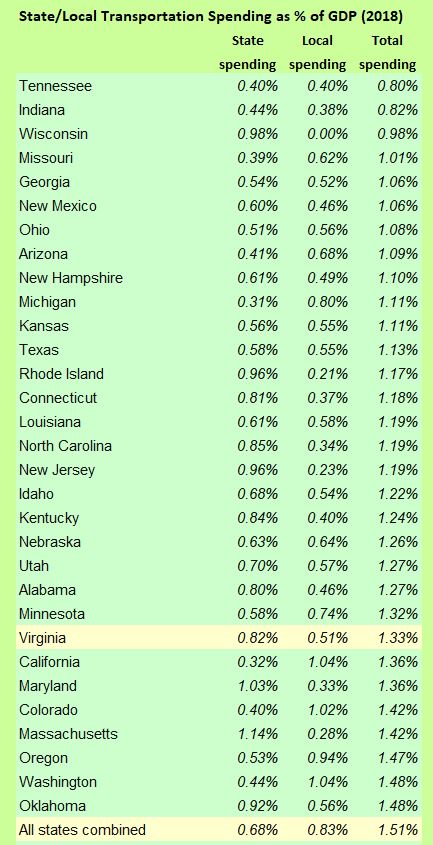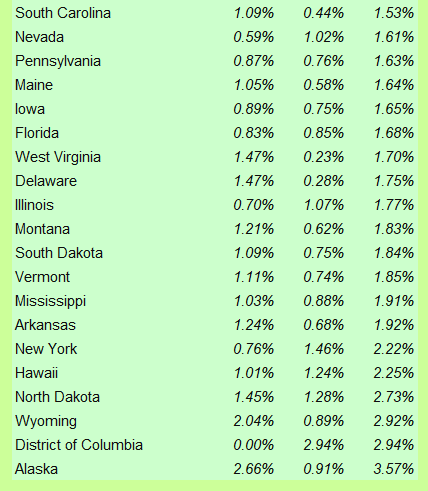 Northern Virginians are complaining again about their inadequate transportation infrastructure, and I can’t blame them. Traffic is terrible, especially on transportation arteries like Interstate 95, and I avoid going up there, or even through there, if I possibly can. NoVa is transportation hell — a point that was reiterated Wednesday during a forum sponsored by the Northern Virginia Chamber of Commerce. As usually happens, however, participants defined the problem as not enough money.
Northern Virginians are complaining again about their inadequate transportation infrastructure, and I can’t blame them. Traffic is terrible, especially on transportation arteries like Interstate 95, and I avoid going up there, or even through there, if I possibly can. NoVa is transportation hell — a point that was reiterated Wednesday during a forum sponsored by the Northern Virginia Chamber of Commerce. As usually happens, however, participants defined the problem as not enough money.
“We are in the position (where) we don’t have more money,” said panelist Monica Backmon, executive director of the Northern Virginia Transportation Authority, according to Inside Nova. “We have an open call for projects right now, but the reality is that’s for Fiscal Year 24 and 25. If you need more money on previously funded projects, I really don’t have it.”
Where will the money come from? Ed Mortimer, a U.S. Chamber official, said the federal government needs to do more. Secretary of Transportation Shannon Valentine argued that Virginia is relatively undertaxed and should boost its gas tax.
Given the paralyzing political polarization in Washington, D.C., these days, I don’t expect any solutions coming out of the nation’s capital. But Richmond hasn’t reached the same level of dysfunction. What about a higher gas tax? Does that idea make sense?
True, Virginia does have a relatively low per-gallon tax on retail gasoline. But comparisons are tricky. The state also taxes the wholesale price of gasoline. How do state-by-state comparisons stack up when that is taken into account? Virginia also has all manner of non-fuel taxes, including a sales tax. Then there are regional taxes in Northern Virginia and Hampton Roads and an increasing number of tolls. Plus, many local governments supplement state transportation dollars with spending of their own.
Here is a state-by-state breakdown of transportation spending provided by the USGovernmentDebt.us website for 2018:
Virginia transportation spending as a percentage of GDP is lower than the national average, which suggests that Virginians are undertaxed. But there are 23 states that are taxed less. Just wondering, is transportation in Tennessee, which spends about 60% of what Virginia spends, notably worse off?
Several key points were omitted from the Chamber forum discussion:
- Transportation spending needs vary widely across Virginia. Conditions have reached crisis proportions in some places, and they are manageable in others. The appetite for higher taxes will vary widely.
- Traffic levels are, to a significant degree, a function of the size of the metropolitan area (larger metros almost universally have worse congestion) and land use patterns within the metros. More scattered, low-density, disconnected and autocentric land use patterns generate more automobile trips per household. Zoning codes and comprehensive plans have throttled the ability of real estate markets to meet the rising market demand for walkable urbanism.
- Congestion on arterial highways reflects decades-long policies by local governments to co-opt inter-city and inter-state corridors for local traffic, thus displacing costs from local taxpayers to state and national taxpayers.
- Virginia’s transportation funding system has evolved away from a user-pays system toward a spread-the-pain funding system, in which subsidies and cross-subsidies are rampant. Very rarely do users of Virginia’s roads, streets, highways, and mass transit systems directly pay their full costs.
- There is rampant confusion between the cost of maintaining the condition of the transportation network and the cost of utilizing scarce transportation capacity during periods of peak demand. Variable congestion tolls on Interstates is more common now than in the past, but they are widely resented, and there is no appetite for adopting congestion pricing elsewhere.
It is impossible to have a rational discourse about transportation policy in Virginia without addressing these issues. When the go-to suggestions are mo’ money from Washington and mo’ money from Richmond, we’re getting nowhere fast.




